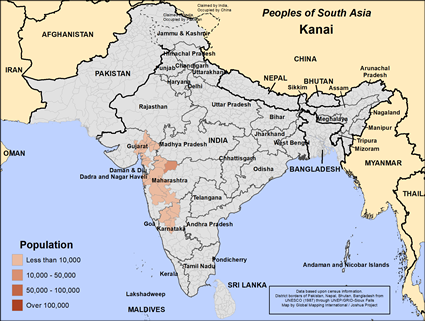The Muslim Kanai people live primarily in western India, particularly in the states of Maharahstra, Gujarat and Karnataka. Historically, they have engaged in agriculture and trade, adapting to the economic landscape of the region. The Kanai have a long-standing presence in the region, contributing to local economies through farming and small-scale commerce. Over time, they have balanced their traditional occupations with modern economic opportunities, though many still rely on agriculture for their livelihood.
The Kanai people lead primarily agrarian lives, growing crops such as wheat, rice and vegetables. Agriculture remains their main source of income, though some Kanai families have diversified into small businesses or moved to nearby urban centers for work. Villages are often organized around family units, with extended families living close together and supporting one another in farming and household responsibilities.
Houses in Kanai villages are typically simple, built from local materials such as brick and mud and designed to withstand the region's hot climate. Life revolves around farming cycles, with work intensifying during planting and harvest seasons. Although many Kanai have embraced modern agricultural techniques, most still rely on traditional methods passed down through generations.
The Kanai people practice Sunni Islam, following the religious practices and teachings of the Quran. Daily prayers, fasting during Ramadan and the celebration of festivals such as Eid al-Fitr and Eid al-Adha are central to their religious lives. Local mosques serve as community centers, where families gather for prayers, religious education and social events.
In addition to their religious duties, the Kanai people observe rituals and customs tied to their agricultural activities. These traditions often involve prayers for good harvests and the well-being of livestock, reflecting their close connection to the land and their dependence on farming.
The Kanai people face several challenges, particularly in terms of access to modern healthcare, education and economic development. While agriculture remains a primary occupation, many Kanai families experience instability due to environmental factors such as drought and unpredictable weather patterns. Access to improved irrigation, modern farming techniques and agricultural support programs would help increase crop yields and provide greater economic security.
Education is another critical need. Many Kanai children lack access to quality schooling, especially in rural areas. This limits their opportunities for social and economic advancement. Furthermore, healthcare services are often insufficient, with many families relying on traditional remedies or traveling long distances to access medical care.
Development programs that focus on enhancing healthcare, expanding education and providing support for sustainable agriculture would significantly benefit the Kanai people, helping them improve their livelihoods while preserving their way of life.
Pray for Kanai culture to be renewed and enhanced by a work of the Holy Spirit into a God-centered and God-honoring mold.
Pray for the Holy Spirit to move among Kanai family and community leaders to seek his face and enjoy his blessings.
Pray for the Lord to thrust out workers who will be compelled to nurture a movement to Christ among the Kanai people.
Pray that soon the Kanai people will have faith that will lead them to live honorable lives that will draw others to the savior.
Scripture Prayers for the Kanai in India.
Ethnologue: Languages of the World
Reports from Indian NGOs on rural and Muslim communities
Academic research on agricultural and Muslim communities in western India
| Profile Source: Joshua Project |











